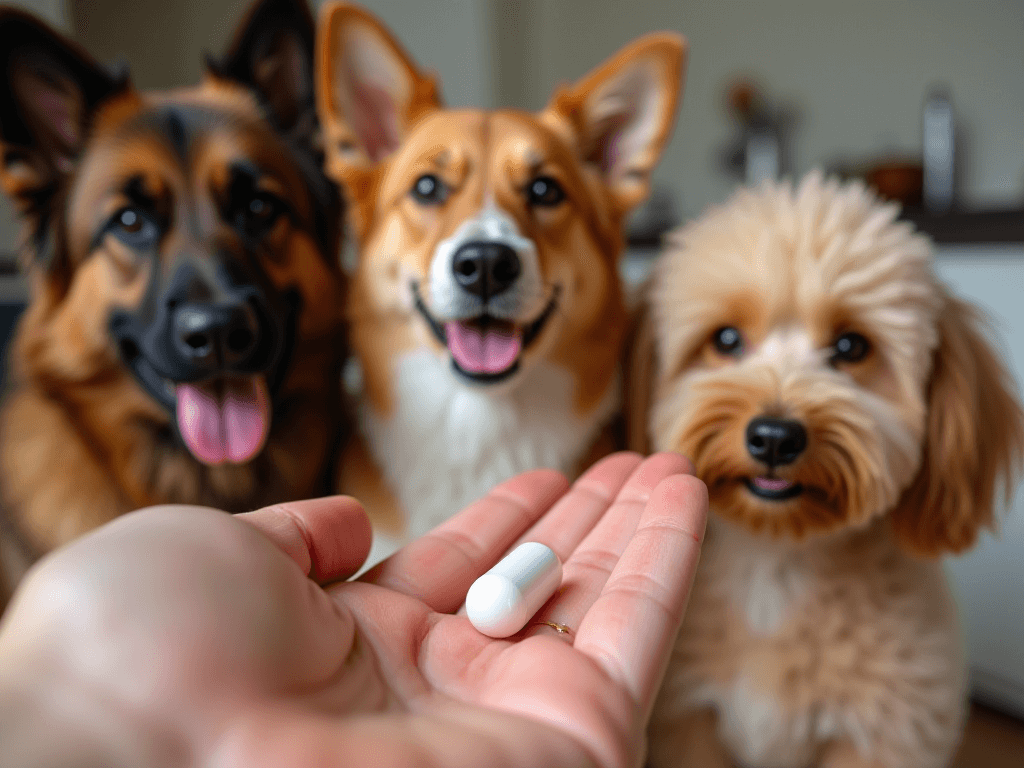Do Human Probiotics Work For Dogs?
Human probiotics are crafted for the unique needs of humans, not dogs. This leads us to question whether our furry companions can benefit from the same supplements.
While sharing might be caring, it’s crucial to provide species-specific care for optimal health—like probiotic chews for dogs that are designed to meet their unique needs.
What Are Probiotics And Prebiotics?
Probiotics are live beneficial microorganisms, such as bacteria and yeast, that play a crucial role in maintaining the health of the gastrointestinal tract by balancing the gut microbiome. These microorganisms aid in digestion, boost immune function, enhance nutrient absorption, and may even influence mental health.
Prebiotics, their non-digestible food counterparts, include fibers like inulin, fructooligosaccharides (FOS), galactooligosaccharides (GOS), and resistant starch, which nourish and promote the growth of these beneficial bacteria.
Together, probiotics and prebiotics support a healthy digestive system, strengthen the immune system, and contribute to overall health by fostering a balanced microbiome.
Does My Dog Need Probiotics? Listen To Their Gut!
If your dog is experiencing digestive issues such as diarrhea, constipation, gas, or vomiting, Inflammatory Bowel Disease (IBD), gastroenteritis, or pancreatitis, these may be signs of an imbalanced gut flora.
Utilizing a targeted prebiotics and probiotics supplements for dogs can help restore this balance. These premium-quality canine probiotic chews are designed to enhance gut health, support the immune system, and facilitate smoother digestion, leading to improved overall health and comfort for your pet.
Want more information? Check out 10 Signs Your Dog Needs Probiotics (And Why You Should Act Now) to learn more!
So, Why Should My Dog Take Probiotics?
Incorporating probiotics into your dog’s diet offers a multitude of benefits that can significantly enhance their quality of life. Here’s how probiotics can positively impact your dog’s health:
1. Improved Digestive Health: Probiotics help maintain a balanced intestinal flora, which is essential for effective digestion and absorption of nutrients. This can lead to fewer digestive issues such as diarrhea, constipation, and gas.
2. Enhanced Immune System: A large portion of the immune system is located in the gut. By promoting a healthy balance of gut bacteria, probiotics strengthen the immune system, helping your dog fight off infections and illnesses more effectively.
3. Allergy Management: Probiotics can help reduce the severity of allergies by improving the gut barrier, which can prevent allergens from entering the bloodstream and triggering immune responses.
4. Mood and Behavior Benefits: Emerging research suggests a connection between gut health and brain function, known as the gut-brain axis. A healthy gut can contribute to improved mood and reduced anxiety in dogs, leading to better overall behavior.
5. Weight Management: Healthy gut flora can aid in regulating metabolism, which can help maintain a healthy weight for your dog.
6. Skin and Coat Health: Probiotics can help improve skin conditions and promote a shinier, healthier coat by reducing inflammation and supporting nutrient absorption.
By addressing these key areas, probiotics not only improves physical health but also contributes to a happier, more active lifestyle for your furry friends. This holistic approach to wellness is why many veterinarians recommend the inclusion of probiotics in a dog’s regular diet.
Dog Probiotics vs Human Probiotics: Are Dog Probiotics Different Than Human?
Yes, dog probiotics are specially formulated based on the specific needs of dogs’ microbiomes, which differ from humans. This makes dog-specific probiotics more effective for your pet than human probiotic products.
Comparing The Human And Dog Microbiomes
Human Microbiome
The human microbiome is incredibly diverse, influenced heavily by an individual’s diet, lifestyle, and environmental factors. It consists of numerous bacterial species that play critical roles in digesting a wide range of foods, protecting against pathogens, and supporting immune function. Humans typically have a balanced mix of bacteria adapted to process carbohydrates, fats, and proteins, reflecting our omnivorous diet.
Dog Microbiome
Conversely, the dog microbiome is specialized to suit a carnivorous diet, focusing on efficiently breaking down proteins and fats. This adaptation is a result of their evolutionary background as carnivores and scavengers. Dogs have a distinct set of bacterial populations that are geared towards high-protein and high-fat diets, with less emphasis on carbohydrate-rich or plant-based fibers.
3 Key Distinctions:
1. Dietary Adaptation: Dogs’ microbiomes are fine-tuned to metabolize animal proteins and fats more effectively than humans, aligning with their natural dietary preferences.
2. Bacterial Composition: While there may be overlap in some bacterial strains between humans and dogs, the proportions and activities of these bacteria can vary greatly. Dogs typically have higher levels of specific types of bacteria that aid in protein and fat digestion.
3. Functional Specialization: Both microbiomes support health by aiding in digestion and enhancing immune defense, but the specific bacteria and their roles in these processes can differ significantly due to the host’s dietary habits.
So, Are Dog Probiotics The Same As Human Probiotics?
No, they’re not. Dog probiotics contain strains that are specifically beneficial to dogs, helping to address their unique health needs effectively.
Is It Ok To Give Human Probiotics To Dogs?
Generally, it’s safer and more beneficial to give your furry friends probiotics specifically formulated for dogs to avoid any potential inefficacy or adverse effects.
RELATED: Should I Give My Dog Probiotics Every Day?
Can Dogs Have Human Probiotics?
While not ideal, in most cases, consuming human probiotics won’t harm your dog. However, they will not provide the tailored benefits that dog-specific supplements offer.
Are Human Probiotics Good For Dogs?
Human probiotics aren’t necessarily harmful, but they lack the targeted support that canine-specific formulas provide, making them less effective and useless for dogs.
Are Human Probiotics Safe For Dogs?
Human probiotics generally won’t endanger your dog, but they aren’t optimized for canine health, making them a less than ideal choice compared to dog-specific options.
What Human Probiotics Are Safe For Dogs?
While some human probiotics might be safe, they do not cater to the specific needs of dogs. It’s best to choose products designed explicitly for canine health.
What Happens If My Dog Eats A Human Probiotic?
If your dog accidentally consumes a human probiotic, the effects are generally mild and not typically harmful. However, the efficacy and benefits of these human-targeted probiotics may not align well with your dog’s specific health needs due to the different bacterial strains they contain.
Potential Outcomes:
1. Limited Benefits: Human probiotics are formulated with bacterial strains that cater to the human gut. These may not be the most effective for promoting canine gut health. While they might not cause harm, they are unlikely to offer the significant health benefits that dog-specific probiotics would.
2. Digestive Discomfort: In some cases, consuming human probiotics can lead to mild digestive issues in dogs, such as gas or changes in stool consistency, especially if the probiotic contains strains or quantities of bacteria that are not ideal for the canine digestive system.
3. No Adverse Effects: Many dogs may ingest human probiotics without experiencing any noticeable effects. This outcome depends on the amount ingested and the dog’s individual sensitivity to the ingredients.
Can Dogs Have Human Probiotic Yogurt?
While small amounts might not harm, the probiotics in human yogurt are not designed for dogs and could lead to digestive discomfort.
Can I Give My Dog Human Probiotics For Diarrhea?
Using human probiotics to treat diarrhea in dogs is not generally recommended due to differences in the formulations tailored specifically for humans versus dogs. While human probiotics might not harm your dog, they are unlikely to be as effective in treating canine-specific issues like diarrhea because they do not contain the specific bacterial strains that are most beneficial to dogs.
Here’s why human probiotics may not be the best choice for treating diarrhea in dogs:
1. Species-Specific Strains: Human probiotics are formulated based on the typical bacterial strains found in the human gut, which can differ significantly from those in the canine gut. Dogs have specific probiotic needs that are best met by canine-specific supplements.
2. Effectiveness: The bacterial strains in human probiotics may not colonize the dog’s gut effectively, thus offering limited benefits in combating the pathogens or conditions causing diarrhea.
3. Dosage and Formulation: The concentration and dosage of bacteria in human probiotics are designed for human bodies and may not be appropriate for dogs, potentially leading to inadequate or excessive dosages when given to pets.
Better Alternatives:
For treating diarrhea in dogs, it’s advisable to use veterinary-approved probiotics that are specifically designed for canine health. These products contain appropriate strains such as Enterococcus faecium, Bifidobacterium animalis, Lactobacillus acidophilus, and others that are known to help stabilize the digestive tract and support healthy bowel function in dogs.
If your dog is suffering from diarrhea, consult with your veterinarian who can recommend a suitable canine-specific probiotic. They can also determine if the diarrhea is symptomatic of a more serious underlying condition that needs to be addressed with additional medical interventions.
Can Dogs Take Human Probiotics For Yeast Infection?
It’s crucial to consult a veterinarian for proper treatment, as human probiotics may not effectively address yeast infections in dogs.
Potential Risks Of Human Probiotics For Dogs
When considering whether to give your dog human probiotics, it’s crucial to understand that while these products are generally safe, they may not be the most effective choice for your furry friend. Human probiotics are specifically tailored for the human gut, meaning they contain bacterial strains that align with human health needs, not necessarily those of your dog.
Here’s what you might want to consider:
1. Mismatched Bacterial Strains: The strains found in human probiotics might not provide the same benefits to your dog, as dogs require specific bacterial profiles to best support their digestive health. This means the probiotics might not be as effective in promoting gut health or alleviating digestive issues in your pet.
2. Inadequate Dosage: Human probiotics are dosed according to human requirements. This difference in scale can result in your dog either getting too little to be effective or potentially too much, which could lead to digestive imbalances or discomfort.
3. Digestive Upset: Although rare, there’s a chance your dog could experience mild digestive upset, including gas or changes in stool consistency, due to the unfamiliar probiotic strains. Most dogs might handle this without any serious issues, but it’s an unnecessary risk when dog-specific options are available.
As a loving pet owner, you want what’s best for your dog, especially when they’re feeling under the weather. Opting for probiotics specifically designed for dogs not only ensures that the bacterial strains are optimized for their unique digestive system but also minimizes any risk of side effects.
Pre & probiotics for dogs are made with your dog’s health in mind, providing the right support to help them maintain a healthy gut and overall well-being.
What Is A Natural Probiotic For Dogs?
Natural probiotics for dogs are formulated to support their digestive systems and overall health, ensuring they receive the maximum benefit from each dose.
Benefits Of Probiotics Formulated For Dogs
Understanding the myriad benefits of probiotics formulated specifically for dogs is the first step in ensuring your pet’s long-term health and happiness. When you choose a probiotic that’s designed just for dogs, you’re investing in their overall well-being, from their gut to their mood.
Key Benefits of Dog-Specific Probiotics:
1. Optimal Digestive Health: Probiotics designed for dogs are packed with strains that are particularly effective in aiding digestion and nutrient absorption in dogs, helping to prevent and alleviate issues such as diarrhea, gas, and bloating.
2. Stronger Immune Defense: A healthy gut is a cornerstone of a robust immune system. With the right probiotics, your dog’s natural defenses are reinforced, protecting them from various illnesses.
3. Improved Skin and Coat Health: The right balance in gut flora facilitated by probiotics can lead to visible benefits such as a shinier coat and healthier skin, often reducing the occurrence of allergy-related skin issues.
4. Behavioral Improvements: There is growing evidence that gut health is linked to mood and behavior. Dogs with balanced microbiomes tend to exhibit less stress and more stable behavior.
As you consider these benefits, it’s important to choose a product that’s not just effective but also easy for your pet to take.
What Makes PetOptimum Probiotic Chews for Dogs Special?
- Specifically Selected Strains: We’ve chosen strains that are most beneficial for canine health, ensuring each chew is packed with the right kind of support.
- Palatability: Dogs love them! Our chews taste like treats, making it easy to incorporate them into your dog’s daily routine.
- Commitment to Quality: Produced in top-tier facilities, our chews meet stringent quality standards to bring peace of mind to health-conscious pet owners.
By integrating PetOptimum Probiotic Chews into your dog’s diet, you’re not just treating them to a daily snack—you’re enhancing their health in profound ways.
How To Introduce Probiotics Into Your Dog’s Diet
Introducing probiotics into your dog’s diet can significantly enhance their digestive health and overall well-being. To begin, start with a small amount of the probiotic supplement mixed into your dog’s usual food. Gradually increase the dosage over a few days to the recommended amount. This gradual introduction helps to ensure that your dog’s digestive system can adapt without any discomfort.
Consistency is key when adding probiotics to your dog’s diet. Administer the probiotic at the same time each day to maintain a steady level of beneficial bacteria in your dog’s gut. Consistent daily supplementation helps to stabilize the gut flora and provides the best results over time.
It’s essential to follow the specific feeding instructions on the label of the probiotic product. These instructions are designed to optimize the benefits while ensuring safety, detailing the appropriate dosage according to your dog’s weight and health needs.
Finally, keep an eye on how your dog reacts to the new addition to their diet. While most dogs respond well to probiotics, each dog is unique and may require adjustments. If you notice any signs of gastrointestinal upset or other changes, it might be wise to consult with your veterinarian. With the right approach, probiotics can play a pivotal role in supporting your dog’s health, contributing to a happier, more vibrant pet.
Balancing Good And Bad Bacteria
Probiotics help maintain this balance, crucial for your dog’s health, by providing beneficial bacteria that outcompete harmful ones.
Contributing To A Healthy Immune System
A robust immune system supported by probiotics can help your dog resist infections and maintain overall health.
How To Find The Best Dog Probiotics?
Look for products that are specifically designed for dogs, contain a variety of probiotic strains known to benefit canine health, and have positive reviews and veterinarian recommendations.
DON’T MISS: Why Do Dogs Lick Their Paws?
So, What Should You Look For In Dog Probiotics?
When choosing a probiotic supplement for your dog, it’s important to consider several key factors to ensure you’re selecting a high-quality product that will be beneficial for your pet’s health. Here are some guidelines on what to look for in dog probiotics:
1. Species-Specific Strains: Look for probiotics that contain strains specifically beneficial to dogs. Some strains are more suited to the canine gut than others. Common effective strains for dogs include Enterococcus faecium, Lactobacillus acidophilus, Bifidobacterium animalis, and Lactobacillus rhamnosus.
2. CFU Count: The colony-forming units (CFU) indicate the number of viable bacteria in a probiotic. Generally, a higher CFU count means more potential for beneficial impact, but the right count depends on the specific needs of your dog. Look for products that clearly state their CFU count and have at least 1 million CFUs per dose.
3. Certifications and Quality Assurance: Choose probiotics from companies that follow strict manufacturing processes. Certifications from independent bodies like the National Animal Supplement Council (NASC) can be a good indicator of quality and safety.
4. Stability and Viability: The best probiotics are those that can survive the acidic environment of your dog’s stomach to reach the gut where they can exert their benefits. Look for products that guarantee viability through the expiration date, not just at the time of manufacture.
5. Ingredient Transparency: A reputable probiotic will list all its ingredients clearly, including the types of bacteria it contains and any other components like prebiotics, which help nourish the bacteria and enhance their effects.
6. No Harmful Additives: Ensure the probiotic does not contain harmful additives or fillers. Avoid products with artificial colors, flavors, or preservatives that could be detrimental to your dog’s health.
7. Specific Health Needs: Consider any specific health issues your dog may have. Some probiotics are targeted towards puppies, seniors, or dogs with particular health issues like allergies or chronic gastrointestinal problems. Choose a formula that best suits your dog’s age and health conditions.
So, Can Dogs Take Human Probiotics?
While dogs can technically consume human probiotics without severe risk, they are not the optimal choice for canine health. Human probiotics are specifically formulated for the human gut, differing significantly from what dogs require.
To ensure effective support and avoid potential digestive issues, it’s best to use probiotics designed specifically for dogs. These are tailored with bacterial strains that align with a dog’s unique digestive system needs, promoting better health and effectiveness.



